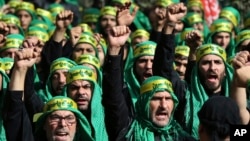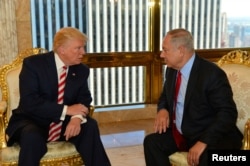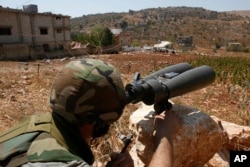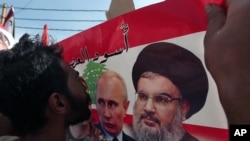As the Trump administration promises to take a hard line on Iran, U.S. pressure could rise against Iranian proxy Hezbollah, which has a key fighting role in backing the Syrian regime in its fight against rebels, analysts say.
In their first meeting next week, Israeli Prime Minister Benjamin Netanyahu is likely to use U.S. President Donald Trump’s frustration with Iran to pursue new sanctions against Tehran and seek pressure on Hezbollah, according to analysts.
The two leaders will meet at a critical time with the new U.S. administration cobbling together its Mideast strategies. They will be seeking to reboot a relationship that fractured under icy relations between Netanyahu and former U.S. president Barack Obama.
Hezbollah – known as “the Party of God” – is considered a terrorist organization by the U.S. and European allies, and follows a Shi'ite ideology that calls for the destruction of Israel. It has expanded beyond its Lebanese borders in recent years and has been fighting in Syria on behalf of President Bashar al-Assad and Iran in Syria's civil war.
"Iran seeks to annihilate Israel, it seeks to conquer the Middle East, it threatens Europe, it threatens the West, it threatens the world. And it offers provocation after provocation," Netanyahu said in Britain this week.
"That's why I welcome President Trump's assistance of new sanctions against Iran,” he said, adding that he hopes other nations join in.
Netanyahu agenda
Netanyahu, whose Israeli forces have struck Hezbollah convoys in Syria, is likely to make the pitch that sidelining Hezbollah is good for the security of the volatile Mideast, analysts say.
“It is obvious that not only Israelis but some Gulf rivals of Iran are going to carry their goals on the waves of Trump’s anger with Tehran,” said Joseph Bahout, a scholar in Carnegie's Middle East Program. “Netanyahu will clearly do his best to convince the U.S. president that … hampering Hezbollah is a big part of the security base strategy he tries to share with Trump.”
Sam Bazzi, a Middle East affairs analyst and director of the Islamic Counterterrorism Institute based in Washington, D.C., said Hezbollah is worrisome on a number of levels, particularly if confrontation with Iran is looming.
“I'd say in this particular situation one cannot go to the heart of the regime before paralyzing its long arms: Hezbollah, the pro-regime Iraqi Shi'ite militias, and the Houthis [in Yemen],” Bazzi said.
“Organically attached to the Lebanese Shi'ite diaspora, Hezbollah can inflict terror attacks throughout the world, bringing chaos to the West and many other countries worldwide," Bazzi said. "The Iraqi Shi'ite militias loyal to Tehran can attack U.S. and Western troops in Iraq.”
Both are “very vulnerable” now in Syria and Iraq, said Bazzi.
“The U.S. Air Force flies over them, and Sunni and Wahhabi militias wage war against them,” he said. “Without the Russian political and military umbrella, the U.S. can wipe out the Hezbollah forces deployed in Syria in a matter of weeks, which would certainly lead to the fall of the Assad regime. This, of course, could trigger chaos in Iran and embolden the Iraqi Sunnis.
“Indeed, with Trump's rise to power, many members of the Shi'ite community in Lebanon are increasingly frightened and unsure about the future,” Bazzi said.
Hezbollah intentions
For its part, Hezbollah hopes that Trump is so busy pursuing his “America first” policy that he will leave a lighter U.S. footprint in the Middle East, perhaps even setting the stage for a withdrawal from the region.
“The more the U.S. policy turns toward isolationism, the more relieved the world would be from its troubles,” Nawwaf Moussawi, a member of Hezbollah in the Lebanese parliament, said last month.
Some analysts believe Hezbollah has reasons for optimism and that Trump’s possible policy in the region could, by default, strengthen the militant group.
“Trump’s reluctance toward the fight in Syria will practically provide more room for Hezbollah, a major player in Syria, to grow and flourish,” said U.K.-based Middle East scholar Scott Lucas, an editor at the EA Worldview research organization.
Others argue that Hezbollah doesn’t have the resources to create further instability in the region.
“Hezbollah, now at its weakest situation ever in terms of legitimacy and manpower due to the big losses it suffered in Syria, will unlikely create unrest during the newly formed U.S. administration as it does not want to attract Trump’s attention to its existence,” said Alex Vatanka, a senior analyst at the Washington-based Middle East Institute.
Vatanka added that Hezbollah has lost its legitimacy among many Arab nations because of its involvement in Syria, and is transforming itself from a self-defending militant group inside Lebanon to a mercenary force for Iran.
However, Hezbollah’s supporters believe that the group will pursue its long-held policy of fighting the occupation of what it calls Palestine by Israel, regardless of who is in charge in Washington.
"Hezbollah does not see much difference in power transition at the White House and will pursue its mission, which is to continue fighting against occupation," said Salem Zahran, head of Media Focal Center, a pro-Hezbollah group in Beirut.
US-Russia dynamic
There also are questions about how Trump’s seemingly friendly approach toward Russia will affect the new U.S. policy in the Mideast. The Kremlin not only treats Hezbollah as an ally in the region, but also has reportedly armed the group.
“Trump’s rapprochement with Russia makes the situation more uncertain in the region, and this is what makes [Israel] concerned,” said Meir Javedanfar, a Tel Aviv-based analyst.
In 2014, Russia’s deputy foreign minister, Mikhail Bogdanov met with Hezbollah leader Hassan Nasrallah in Beirut to discuss regional developments.
“We maintain contacts and relations with them [Hezbollah] because we do not consider them a terrorist organization,” the Interfax news agency quoted Bogdanov as saying.
Hezbollah also has claimed the group has the Kremlin’s blessing.
“We are strategic allies in the Middle East right now - the Russians are our allies and give us weapons,” a Hezbollah commander who called himself Bakr told the Daily Beast last year.







